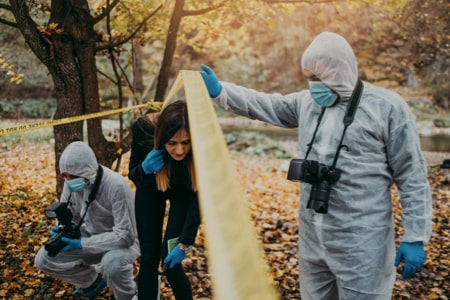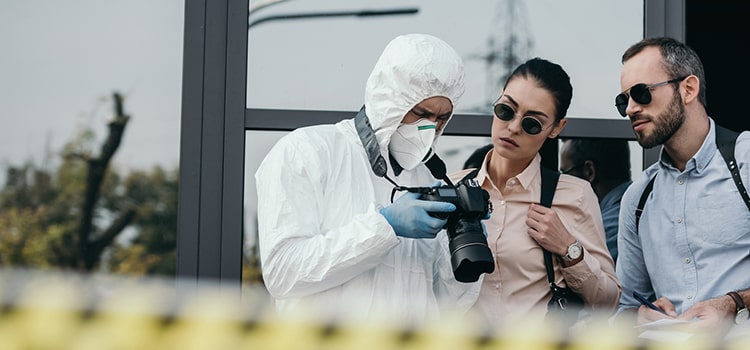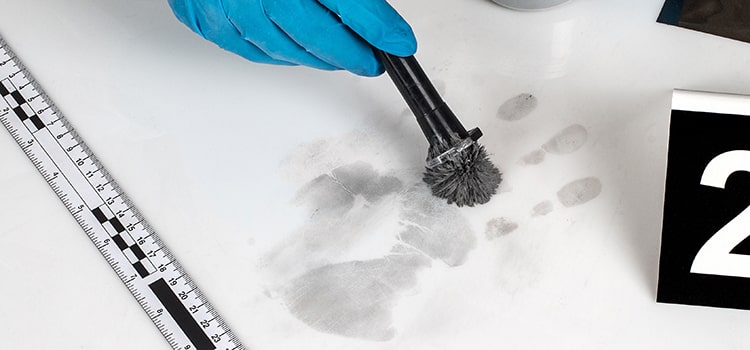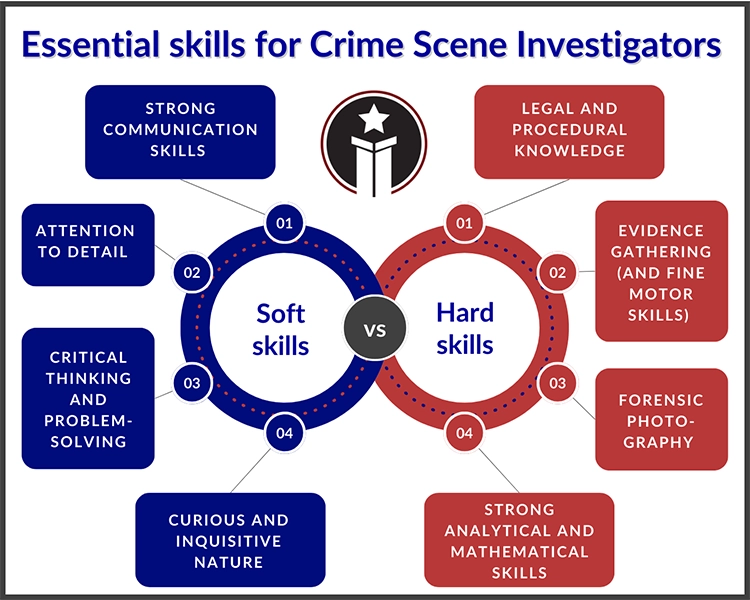In this Article
Crime Scene Investigator (CSI) Education Guide

What Is a Crime Scene Investigator?
A CSI, or Crime Scene Investigator, plays a crucial role in gathering and analyzing evidence at crime scenes. Typically employed by state or federal law enforcement agencies, CSIs are responsible for meticulously extracting and documenting all potential pieces of evidence. While a background in science is often preferred, individuals with relevant qualifications may also qualify for this position.
Steps to Become a Crime Scene Investigator
Crime scene investigators (CSIs) are often promoted to their jobs internally after a certain number of years of patrol work. But some large local, state and federal police departments also employ civilian crime scene investigators.
Decide on civilian vs. police academy route.

When crime scene investigation is needed, police officers are the primary CSIs, but they also solicit the help of specialists or transfer cases to a CSI team. Going the police route means gaining admittance to a police academy, with an application that requires a high school diploma and sometimes college. This can be a great option if you are interested in rising through the ranks of a precinct.
If you aren’t interested in joining a police force, then earning a forensics or crime scene investigation degree can help. Those following the civilian route will need to look for internships and other professional experience to demonstrate the knowledge they’ve gained in their education. Civilian CSIs have can be hired to CSI units in police precincts as well as private industry.
In either situation, you’ll need to consider the prerequisites for the job: being able to squat, having a clean background check, and passing a vision test are just a few examples of some of the essentials for CSI work. If you are going the police academy route, you’ll find more physical requirements in play.
Pursue a degree.

If you are interested in pursuing a career in CSI via joining a police department, you should investigate department in your area for specific requirements, as well as state law. Police officers need at least a high school diploma or GED, but many departments now require a college degree. A degree in criminal justice with a focus in crime scene investigation could give you an edge over competition and help you get the job you really want. In areas where degrees are not required, academy candidates can earn a degree in criminal justice or crime scene investigation to bolster their application.
Those following the civilian route by applying for crime scene investigation, forensic, or hard science (chemistry, biology, physics, etc.) degree programs should have at least a high school diploma or GED before beginning the application process.
Apply for jobs.

Once you’ve graduated from your chosen program, you are ready to apply for jobs. Look for state and local forensics associations, county and city job boards, and police departments in areas you want to work to find who’s hiring. LinkedIn and other social networks can be a useful way to keep in contact with the network of instructors, peers, and professional contacts you built during your education.
If you choose to go the police track, you’ll need to apply to entry-level positions for police officers, which require police academy training. For admittance to the police academy, you may need to meet minimum physical fitness requirements, pass a background check, and have or be able to obtain a valid driver’s license. Civilians can apply directly to any crime scene investigations jobs they see posted for civilians without going through the police academy.
Start crime scene investigation specialized basic training.

No matter which path you choose, most entry level positions will require a training period.
Most police departments require the completion of basic training at their police academy. After that, you’ll need to pay your dues and work your way up to becoming a crime scene investigator. As a police officer, you’ll have a probationary period after your academy training, and as you progress towards crime scene investigation, you’ll need to talk to your superiors about opportunities to train in CSI.
As a civilian in an entry level crime scene investigation position, you’ll likely have a period of supervised probation as well. In either path, stakes are high for you to get things right with evidence. Most training periods are paid and could transition to full positions.
Obtain professional certification.

Professional certification is one way to prove your expertise, especially if you want to transfer precincts or advance within the chain of command. While there is no national requirement for certification, it is often a requirement at the state, county, or city level. Certification, or a lack thereof, can affect your ability to advance within the field as well.
Education Requirements for Crime Scene Investigators
Each crime scene specialty requires different training. The most common degree for general CSIs is an associate or a bachelor’s degree in criminal justice with a focus on crime scene investigation. Depending on the school, crime scene investigation degree programs may be available as well. You can also start with an associate degree and then move on to a bachelor’s degree or look to double major with a bachelor’s degree in two subjects like Forensic Science and Criminal Justice, depending on what your college offers.
The programs above cover many of the same subjects. To enter the major of your choice, you’ll likely need to take some common courses at your college:
- Introduction to the Criminal Justice System:
- This will help you understand policing, legal system, and corrections, which includes parole and probation.
- Algebra:
- Math is often an important part of crime scene investigation.
- English Composition:
- All CSIs need to write concise, easy-to-understand reports.
- Physical and Biological Science:
- These are the scientific foundations of the evidence analysis that forensic scientists do.
You’ll then delve deeper into your subject matter and learn more about gathering evidence and other facets of criminal justice. As you do, you’ll need to complete course such as:
- Crime Scene Investigation:
- You’ll learn how to process crime scenes, collect evidence, and record what you’ve found.
- Forensic Fingerprint Analysis:
- Fingerprint analysts learn to “read” fingerprints and match prints to ones in the FBI fingerprint identification system, the largest criminal fingerprint database in the world.
- Forensic Chemistry and Trace Evidence Analysis:
- Depending on your specialty, you may analyze fibers, hair, soil, wood, gunshot residue, pollen, and more.
- Supervisory Practices in Criminal Justice:
- Some people aspire to management positions in law enforcement agencies. This course will explain techniques for overseeing other criminal justice personnel.
How Do I Find Good Schools for Crime Scene Investigation?
When evaluating a program or school, check whether the program is accredited. Regional and national accreditation is an indication that a school meets rigorous standards for education and ensures that students can receive federal financial aid. Sometimes specialized accreditation exists for a given program type as well. For example, students choosing a forensic science path should look for accreditation by the Forensic Science Education Programs Accreditation Commission (FEPAC), or compare programs that interest you to those already accredited by FEPAC.
You can also look at the credentials of the educators and administrators of a program, then ask whether they hold the appropriate certifications or degrees in the fields they teach? Do they have significant experience in the field of forensics and criminal investigation? Asking these questions can help you determine if students receive a high quality education from this program.
CSI Certification
While not always required, working CSI professionals should look to earn certification in their field. Different precincts and CSI organizations often have their own standards and policies when it comes to certifying agencies (as well as linking certification to promotion), but there are certifications that are recognized widely. One place to start is the International Association for Identification (IAI). The IAI offers a variety of certifications, like Certified Crime Scene Investigator which lasts five years. Earning and maintaining certification requires approved continuing education credits (like classes and conference meeting activities) and regular testing. Some of the other certifications available include:
Forensic Photography Certification
Latent Print Certification
Bloodstain Pattern Analyst Certification
CSI Job Description
When a crime is reported, police officers hurry to the scene. They can’t always catch criminals immediately (or alone), though, so they count on other experts for help. This is when Crime Scene Investigators are called to the scene.
Crime scene investigators are police officers or civilians who specialize in gathering evidence. Often, specialized CSIs will find a small clue—a spot of blood, a tire track, a fingerprint—that will lead them to a suspect. That’s what CSIs do: they look for useful evidence that will prove someone’s guilt and stand up in a court of law.
The CSIs collect and preserve this evidence, then diagram, photograph, and otherwise document everything they find. The goal of every good investigator is to match evidence to people or other elements, such as vehicles or weapons. They know the proper protocols for collecting all different kinds of evidence:
As you might guess, the job requires close attention to detail, strong scientific and analytical skills, and a curious mind. If crime scene investigators want to bring criminals to justice, they must be systematic and ethical as any mistakes could compromise potentially important evidence.
CSIs must always follow a “chain of custody” to protect evidence so that no one tampers with it. If there are any signs of tampering, evidence will be thrown out by a judge, and prosecutors may have a harder time getting a conviction—or have their case dismissed. Chain of custody is important, as there is a variety of people who play a part in crime scene investigation, such as:
- Police Officers and Detectives:
- Normally the first responders to 911 calls or crime scenes, they evaluate the scene and determine if further investigation is required.
- Forensic Scientists and Technicians:
- Collect evidence at the scene of a crime and/or analyze it in laboratories.
- Forensic Psychologists:
- Use their expertise to investigate criminal motives, evaluate witnesses and suspects, and help legal teams.
- Forensic Photographers:
- Certified photographers that document a crime scene.
- Coroners and Forensic Nurses:
- Licensed medical professionals trained to work with investigators to collect evidence from bodies and, in the case of nurses, process and help victims experiencing trauma.
- Forensic Specialists:
- Specialists like ballistics or computer forensics experts analyze evidence in a forensics lab and determine its importance.
Collecting evidence is a two-part procedure:
1. An initial walk-through gives an overview of the crime scene, identifies threats to the integrity of the scene, and helps the CSI protect any possible evidence. Written and photographic documentation provides a permanent record of this initial state of the crime scene.
2. Then, the CSI will prioritize the collection of evidence to prevent loss, destruction, or contamination. All team members must ensure the effective collection, preservation, packaging, and transport of evidence.
Requirements to Apply
To become a traditional CSI, you’ll usually need to be a police officer, but civilian CSI candidates often share some prerequisites. Some of the basics are you must be a U.S. citizen and usually at least 21 years old. In addition to taking and passing competitive written exams, you’ll need to meet certain physical requirements:
Pass a vision exam
Pass a hearing exam
Prove physical strength
Police candidates normally also go through a series of interviews and need to take lie detector and drug tests, on top of in-depth background checks. Previous law enforcement work or military experience is often a plus.

Crime Scene Investigator Salary
So, how much do crime scene investigators make? For civilians, CSI falls under “forensic science technician” on the Bureau of Labor Statistics salary database, though police officers and detectives also take on the role of Crime Scene Investigator.
Pay for related careers
These careers show the BLS-reported median salaries of the various pathways to joining a CSI team.
